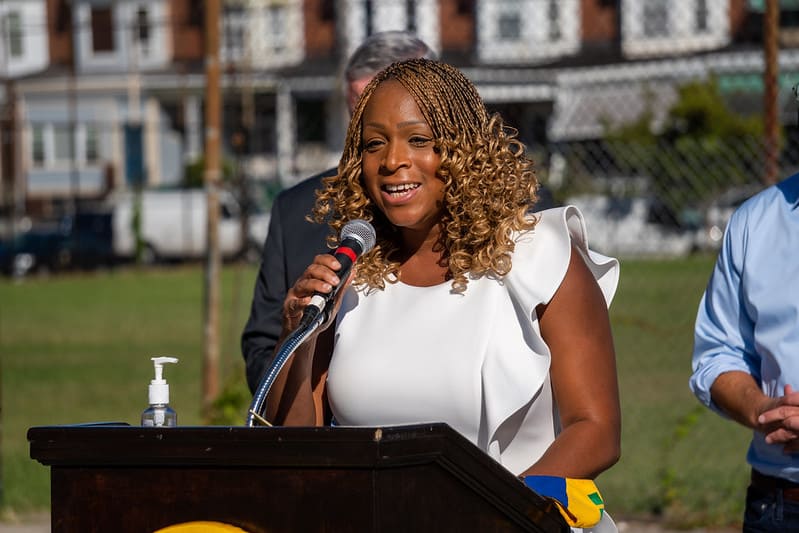Bill preserves affordable housing in future development on the site of the University City Townhomes and a neighboring residential housing complex
PHILADELPHIA – Today, City Councilmember Jamie Gauthier’s (3rd District) Affordable Housing Preservation Overlay District Bill (AHPOD) received final approval from City Council. AHPOD aims to encourage the production of affordable housing in desirable neighborhoods in West Philadelphia. The overlay includes the University City Townhomes at 40th and Market Streets – which are in danger of being lost to commercial development – along with a neighboring location in the 3rd District where low-income residents could be especially vulnerable to displacement without additional policy interventions.
“The way that affordable housing policy has been handled over the years reflects a grave injustice to our communities, and to low-income residents in particular,” said Councilmember Gauthier. “Our ultimate goal with this legislation is to support the public interest by making sure as much affordable housing remains in amenity-rich neighborhoods—which are experiencing immense commercial development pressures—as we possibly can.”
Last year, the owner of the University City Townhomes notified the U.S. Department of Housing and Urban Development (HUD) that they would not be renewing their affordable housing contract, instead opting to sell the property. Given the current market forces in this area of University City, it is highly anticipated that any future development would prioritize commercial development over residential development – a result Councilmember Gauthier considers an injustice, both to the current residents of the Townhomes and to the former residents of the Black Bottom, a majority-Black community which was razed during urban renewal to make way for a science and technology research campus. Concerned with the loss of affordable housing along Market-Frankford transit corridor and similar areas where affordable housing has long been integral to the community but where existing zoning provisions do not require residential uses, the Councilmember began examining the market forces at play in this area along with legislative solutions to this problem.
Since AHPOD’s introduction in October 2021, it has been amended to bring it more in line with the Mixed Income Neighborhoods Overlay (MIN) which, when applicable, requires 20 percent of units to be offered at rents affordable for rental households earning up to 40 percent area median income (AMI), and for owner-occupied households earning up to 60 percent of AMI. Within AHPOD, any nonresidential use must be contained to the first floor in buildings taller than one story; any required affordable units must be built on-site; and the bill will go into effect immediately. If future development occurs, AHPOD in combination with MIN incentivizes dense residential development and maximizing affordable housing units in the overlay areas.
An additional ordinance, Bill No. 220007, expands AHPOD to other transit-adjacent locations that are zoned for commercial mixed-use along the Market-Frankford line. The new ordinance will further ensure affordability by requiring a higher percentage of affordable units, beyond the requirements of MIN, if developers wish to access density bonuses for other purposes. This bill is under consideration by Council and currently awaits a hearing.
AHPOD creates a framework for zoning mixed use properties in high density, amenity rich areas, in order to encourage sustainable residential development where market forces would otherwise replace residential communities with commercial development. The bill intends to prevent the loss of the vibrant community and needed housing in this area and honor the significant prior history of the displacement of lower income communities in this area, in response to the explosion of commercial development in University City over the past decade.
Much of what is now known as University City was created during the nationwide urban renewal period of the late 1960s, when the City of Philadelphia razed a predominantly Black neighborhood once known as Black Bottom to make way for a science and technology research campus. To clear the land needed for this development, the City displaced thousands of Philadelphians – approximately 80 percent of whom were Black – from their homes in Black Bottom.
The land covered by the overlay was initially slated to be developed as part of the research campus, but neighbors and University of Pennsylvania students banded together to fight this plan. In 1969, they lobbied to have multiple sites set aside as affordable housing, and to ensure that people displaced by urban renewal had options to return and would have access to housing in the neighborhood for generations to come. There was also an expectation that any plans in the future for redeveloping the neighborhood would necessarily include input from the community.
Forty years later, much has changed in West Philadelphia. Housing prices have tripled, the Black population east of 52nd Street has been cut in half, and, even during the most acute public health crisis in a century, demand for residential real estate has only increased. Over $5 billion has been spent on construction in University City over the last ten years alone, and there are billions more in the construction pipeline.
The housing emergency in this section of University City reflects a troubling trend unfolding in Philadelphia and across the country. The University City Townhomes is one of approximately 25 developments in the 3rd District, and hundreds citywide, with HUD affordable housing contracts scheduled to expire within the next five years. HUD contracts provide what is by far the most deeply affordable housing available in Philadelphia: residents only need to pay 30 percent of their annual income on rent and utility costs, no matter how low their income may be.
A large portion of government-funded housing sites are owned and operated by profit-motivated companies, who, when facing the option of renewing their HUD contracts or pursuing more lucrative purposes for their properties, may have little incentive to continue offering affordable housing. Councilmember Gauthier believes that it is incredibly urgent to address the continuing loss of these affordable units, which will be exceedingly difficult to replace.
# # #


